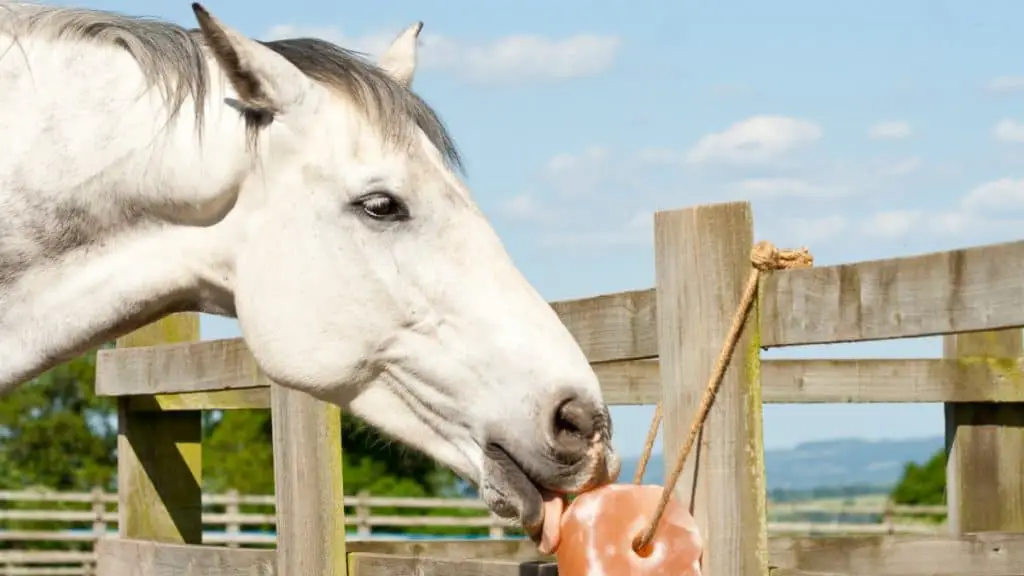Skip To Section
Why Do Horses Lick Salt?
Animals have a tendency to eat things that don’t seem fitting for their diet. Dogs chew on grass, deer eat baby birds, and horses, oftentimes, eat salt. This all sounds strange, but animals often have some reason for doing this.
In the case of the horses, it’s actually quite simple: they lick salt because they need to.
Salt is often viewed as an unhealthy food item, but many organisms need some amounts of salt in their diet to live healthy lives since salt contains sodium and chloride. Horses are no exception, as your average horse needs to consume about fifty to sixty grams of salt daily. This is mostly dependent on how much work they do.
So, why do horses lick salt? Because horses need salt, simply put. Horses are much better than humans when it comes to knowing how much of something they need, so oftentimes, they lick salt because they aren’t getting enough of it out of their regular diet, though it is possible for horses to overindulge. More on that later.

Why Do Horses Crave Salt?
To understand the equine health of horses, it’s pretty important to understand the difference between needing and craving. If you need something, it’s mandatory for survival. If you crave something, it’s just a thing that you want for your personal happiness. Horses are capable of both needing and craving salt as well.
If your horse is the kind that likes to lick a salt block for a little while, but then goes about its regular day, it’s likely that it just has a salt deficiency and needs a little more sodium and chloride in its diet. If you have a horse that will consume an entire salt block in one sitting, it probably just really likes salt.
The latter is what you need to be careful of. Too many grams of salt a day will definitely hurt your horse’s health. If you have a horse that simply likes the taste of salt and will eat more than is healthy if allowed, you’ll need to monitor its salt intake. An essential mineral it may be, but like many things, too much can be even worse than too little.
Are Salt Licks Bad For Horses?
We just told you that too much salt can be bad for horses, so we’d understand if you questioned whether or not salt licks do more harm than good. However, this isn’t something you really have to worry about too much, for one particular reason.
You see, horses are fairly good at taking in the minerals they need, and excreting the excess. Sodium toxicity (a potential risk when horses eat too much salt) is actually a fairly minor concern for a horse owner, as horses often excrete excess sodium through their urine.
This is not to say that there is no risk of using salt licks at all. If a horse consumed a lot of salt but didn’t have enough water to drink, the inability to urinate as frequently as normal could prevent them from excreting excess sodium and possibly lead to sodium toxicity.
That sounds bad, but it’s easily avoidable. As long as your horse has access to enough clean, drinkable water, it is very unlikely that it will suffer from sodium toxicity. All of that said, salt licks are not bad for horses.
In fact, salt licks are a far preferable choice to the alternatives: if a horse is not getting enough salt in their diet and no obvious source of salt is available, they’ll start licking strange things like wood, dirt, or even sweaty hands. A salt lick is a far more preferable option.
What Do Salt Licks Do, And Does Your Horse Need One?
OK, so a salt lick isn’t going to kill your horse. But are there any benefits to a salt lick? Do you absolutely have to have one? Well, there are many potential benefits to a salt lick, but that doesn’t mean they are absolutely mandatory.
1. Providing Nutritional Access
A horse knows when it needs salt, whereas you will have a harder time knowing when they are lacking. A salt lick gives your horse a way to get more salt based on its own needs, so you don’t have to try and monitor its health quite so closely. Salt deficiency won’t be a problem if the horse has easy access to salt.
2. Physical Strength And Beauty
Salt has a lot of trace minerals in it that are crucial to strong muscles and strong bones. Naturally, both of those are pretty important for a horse to have. Having a salt lick around ensures that your horses can maintain strong bodies. These trace elements also play a major role in the shine of a horse’s coat.
3. Keeping The Appetite Up
When a horse doesn’t get enough salt in their diet, their appetite will gradually diminish and they will eat less. We probably don’t need to tell you why it would be bad for your horse to eat less than it is supposed to on a daily basis.
4. Preventing Sickness
All of those trace elements found in a salt lick go a long way in bolstering the immune system of your horse, which means they will be less likely to get sick. As you probably know, a sick horse is not a desirable outcome.
How Critical Is A Salt Lick?
The many benefits we just listed are not specific to salt licks: they are the benefit of salt in general. This means you don’t actually need to get a salt lick to get those benefits. Most horse feed already has sodium and chloride and other trace elements in it. If there’s enough of those minerals in the feed to meet the horse’s dietary needs, then a salt lick is unnecessary.
On the other hand, even if your horse does need some extra salt, it doesn’t have to come in the form of a salt lick. Depending on what type of salt they need, you could simply feed them table salt out of your hand.
So no, you don’t need a salt lick, but it makes the process of getting enough salt in your horse’s diet simple and efficient. just keep in mind that there are different types of salt licks and they are not all created equal.
Conclusion
There’s nothing weird about horses licking salt: horses eat salt because it’s a crucial part of their diet, and they often sweat out a lot of salt when they are working hard every day. They often lick salt because they need to replenish it in their bodies. Even if they eat too much salt, they’ll be fine as long as there is enough drinkable water for the horse to drink.
Horses need salt to maintain their appetites, as well as strong and healthy bodies. A salt lick is an easy way to let a horse consume more salt as it is needed, without you having to try and feed your horse more based on observations that could be wrong.
All of that said, salt licks have many benefits, and as long as you ensure there is enough water to compensate for any horse that eats too much salt, there’s little to worry about in the way of risks.
Find out more interesting horse facts and information by visiting our blog!
